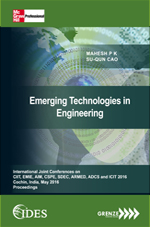Framework for Surplus Food Management using Data Analytics
Conference: Sixth International Conference on Computational Intelligence and Information Technology
AbstractFood wastage is a major problem faced by the entire world in various facets. The food waste not only impacts a country’s economy financially, but also environmentally. The food waste leads to wasteful use of fertilizers and pesticides. More fuel is used for transporting the food to markets and surplus of it to garbage dumps. The wedding parties and functions in India stand as a prestige icon spending money lavishly on large number of variety dishes leading to food wastage. The rotten food creates methane – one of the most harmful greenhouse gases that contribute to climate change and global warming. Methane is twenty-three times more effective than CO2 as a green house gas. A problem properly addressed is a problem half solved. Moreover, a solution to one problem can indirectly solve many other potential problems. Research is being done on how to minimize the food loss and wastage at the supply chain level but no models are developed to channelize the surplus food generated for its prompt utilization. There is an immense need of models that would facilitate the surplus food management to minimize the food loss and wastage with the community contribution and collaboration. |
CIIT - 2016
|
